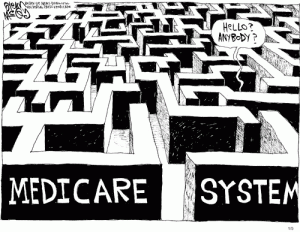California has become ground zero for assisted living reform and this ought to concern ever single assisted living operator in the country.
California has become ground zero for assisted living reform and this ought to concern ever single assisted living operator in the country. It also ought to concern those who think seniors deserve to have affordable, high quality care.
Yesterday (January 14, 2014) a coalition of state legislators and senior advocacy groups announced the introduction of a series of bills titled The RCFE Reform Act of 2014. The series of bills include, among other items, more frequent inspections, higher fines, more specific training and licensing requirements for administrators and care givers, more detailed staffing requirements, more transparency with respect to complaints and regulatory actions..
Why This is Happening
Over the last several months there have been a number of high profile stories about assisted living abuses in California. First up was the distorted Propublica/TV story and article series followed by the San Diego Union Tribune Series titled Deadly Neglect about assisted living in San Diego and, finally, the stories about the abominable abandonment of 19 seniors in Castro Valley. The Castro Valley story was terrible and, more than anything else, highlighted the failure of the State of California’s Department of Social Services in three areas:
- Most critically DSS failed to insure a safe transfer of residents after ordering the closure of the community.
- DSS failed by allowing a person with a history of problems to get a license.
- DSS failed to aggressively deal with problems in a timely manner.
The San Diego UT gets some credit for publishing a story written by Sally Michael the president of the California Assisted Living Association(CALA) that presented a more realistic picture of what assisted living in California looks like. The ProPublica story was a broad brush expose designed to generate a sensationalistic emotional response, but cannot been seen as responsible investigative journalism.
Do We Need More Regulation?
My knee jerk reaction is a solid no, and yet even CALA recognizes that the state is not doing enough to ensure quality and compliance. To this end CALA has proposed an increase in license fees in order to fund better enforcement and oversight. CALA is also advocating for increased staff training, including dementia training, for all caregivers, a stronger administrator certification program and revisions to the state exam. It is pretty clear that licensing inspections ought to happen more than once every five years; that a maximum fine of $150 for the death of a resident is paltry; that assisted living communities ought to be required to carry a reasonably high level of liability insurance and that state inspection reports should be readily available.
The False Promise
The false promise of increased regulation is that it will make bad operators who are bad people become good people. The idea that someone would be willing to put a resident’s life in jeopardy because the fine is only $150, but wouldn’t because the fine is $15,000 is ludicrous. But will more regulations and more specific requirements make bad people in bad operators better? I am doubtful.
What is particularly important to remember, and to point out to anyone who will listen, is that these terrible stories of abuse are outliers, Each took place over a number of years and, in every single case, there were laws and regulations already in place that should have, in theory, prevented the abuse. Regulators had the tools to shut down facilities and prosecute operators, but they did not.
While I think that some of the specific proposals are good ideas I worry that, overall, they will increase costs to good operators, Operators will be forced to pass the costs on to seniors and their families. This will make quality care less affordable and less available. If affordable assisted living is not available, but is needed, it will open the door to more unlicensed, bootleg small operators who mostly operate on such a thin shoestring that the threat of fines or closure means nothing. As an industry we need to be helping each other to provide an excellent product. We should be brutally honest about providers who do a terrible job and we should be talking about what is reasonable legislation.
Steve Moran









Wow, Steve, this blog has turned into a nasty link-bait industry puppet. You started out looking out for the greater industry (which includes the seniors) but now you seem to only care about the industry that makes money and pays your sponsorships. I sincerely hope you find your way.
Hi Daniel:
As you know, I always appreciate comments even ones that take me to task. It’s a little hard to know exactly what you are unhappy with. I want to give a longer response after some more thought, but maybe we could start with me asking what recent articles besides this one you think are puppetering and specifically why.
I acknowledged in this article that I am in agreement with CALA that some reforms are necessary, but when you look at past abuses the problem was less a lack of laws and more a lack of inspections and enforcement. My big concern for much of what is in the package of laws is that it will increase costs to providers which will get passed to residents and that primarily what will happen is that they will be grist for attorneys. Maybe you don’t agree with that position.
Or maybe you are unhappy with my article last week about Emeritus where I didn’t let Emeritus off the hook but I did point out that AC Thompson intentionally ignored important facts in order to make the story as sensational as possible. In my mind that is not ok.
Here is my offer to you. If you would like to write an article about how I have it wrong or how I have gone on the track I would be glad to publish it.
Steve
Steve, I agree with your concerns. I do believe Title 22 is outdated and in need of revision, and I also am in favor of strong penalties for elder abuse and neglect, but as you pointed out, there are already laws in place and adding more regulations will not suddenly give a bad operator better character.
In every industry there are those who look for creative ways to bend the rules to make a profit while barely meeting minimum standards (some companies might even call this a “best practice”). Senior care is no different, and these changes will make it harder for honest people to make a living. My main concern is how it will add to the cost, making it even more difficult for low income seniors to find decent care. At this time, anyone wanting to open a licensed care home can expect to wait as much as a year to complete the bureaucracy and receive final inspection to open. Considering the cost of making a years’ worth of mortgage payments on a home that is bringing in no income, it is no surprise people are getting out of this business, or that the cost is so high that many seniors simply can’t afford to have good care.
During a time when the need for senior care is going through the roof as the “Silver Tsunami” approaches, I guess it would be naive of me to hope that the state would focus on making it easier to put resources in place to better prepare to meet the needs of its senior citizens. Wouldn’t it be nice if licensing, instead of taking an adversarial position by looking for ways to fine and punish operators for minor paperwork oversights, tried to mentor and educate instead? Also, as there are already so few places able to accept low income residents, I would love to see some type of concessions or tax breaks to encourage facilities to accept at least a token number of needy residents. The needs are so great, and instead of promoting a solution to streamline making it easier to help seniors, our government seized the opportunity to make it more difficult and costly.
To open another can of worms, we could argue that seniors could always stay home, except that CA legislature also just enacted the law that requires them to pay caregivers overtime for anything over 9 hours a day or 45 hours a week. This makes it virtually impossible for most seniors to afford a live-in caregiver. I have no problem with fair pay, but remember that these caregivers are not working on an assembly line in a factory. They are spending most of their time sitting around waiting to be needed.
I recently tried to help a lady in her 80s who was evicted from an apartment she had lived in over 30 years because the building was sold and the rents were drastically raised. She was given a pamphlet by a county agency that gave pointers on how she could live in her car. I fear that we may become like countries where families lay their elderly relatives along the side of the road to beg…or die. They deserve better.
Hi Linda
Great comments. I think that perhaps the biggest single failure of the senior living industry on both the for profit and not for profit side is to address the affordability issue head on. I get why this is happening, because they are making money doing it the way they are doing it. But we are going to hear more and more stories like the one you told and it is just not right. Taking a smart balanced approach to passing laws is a good thing. Knee jerk reactionary laws leave the industry worse off and more importantly leave seniors worse off.
Steve
I say again, what are our industry associations planning to counter this and the assassination in the ProPublica expose?
Jay, you ask a great question and I wish I had a good answer.
Steve
I was sad to hear about what happened at the Castro Valley facility. I knew the owner and the licensing situation at Castro Valley and at their other facility in Modesto. I brought the owner a number of very good owner operators and management companies to take over the operations at both Castro Valley and Modesto. The owner turned down all of our attempts to help them. In my opinion, the bar is set way too low to become a certified RCFE or ARF administrator in California. The course and 50 question test is joke.
Title 22 is need of an overhaul. There are too many grey areas within the rules and regulations. However, I am not sure I see how more regulations will help the residents. Community Care Licensing Division seems understaffed and overworked as it is. They need more employees.
Shep you make great points. It is clear that Title 22 needs some serious work, but as you allude to, Castro Valley is a great example of the need to do better with existing laws.
I wanted to specifically address the proposed legislation to require liability insurance for all RCFEs. While I, personally would not take the chance of running any business without liability insurance, I would hope our legislature would look at the affordability and availability of coverage before making it a blanket requirement.
Anyone who watches TV has probably seen the ads, “Has your loved one had a fall or other injury in an assisted living? Call XYZ law firm today! We can get you lots of money!”. Even with the very best care, elderly people will sometimes fall, get sick, and even die, while attorneys use that fact of life to their advantage. This has a huge impact on the cost of liability insurance, and many insurance carriers are refusing to offer policies to high risk senior care businesses, especially in CA.
An owner of a small residential care home rarely has an extra $10,000/year to pay for liability insurance. Keep in mind, even Workers Comp charges high rates of 15% or more for covering caregivers, and I have seen companies go out of business because their policies were cancelled after an employee suffered a work-related injury and filed a claim.
I also wonder, who will have the burden of monitoring and enforcing these new requirements? After repeated budget cuts, it was not long ago Community Care Licensing did not even have a budget to fix and replace the many broken cell phones that were issued to their LPAs, so that many of them were not even able to be contacted when they were out in the field all day. Any private business that exists under these conditions would soon be out of business.
Hi Linda:
You make great point about the cost of insurance.
Steve
From LinkedIn Groups
Florida has many of these regulations in place. There are specific requirements and training for administrators and staff. Florida has staffing requirements and will investigate complaints in a timely manner. Florida has never left a resident in a closed facility. A receiver can be sent to the facility to manage the facility until the residents are removed. Depending on the license, there are facilities that are inspected quarterly. California needs to take a look at Florida. We are not perfect, but we are trying to do what is right.
By Carolyn Moore
From LinkedIn groups
I agree the horrific cases are outliers in most cases. In Texas licensure surveys are every two years and “for cause”. I was surprised to learn that it is five years in CA. That seems like a long time between surveys.
The requirements in each state can be so different and several states I have worked in have regulations that are not (in my opinion of course) in the best interest for aging in place when people have advanced dementia. In the case of dementia care I do think more requirements for education and training of employees are needed in Assisted Living Memory Care and SNF settings too.
I am looking forward to the discussion about this to learn more about what is happening in other areas and the opinions of others since regulations vary state to state.
By Cyndee Frey, RN, MS
From LinkedIn Groups
I agree with you Carolyn, it is a totally different world here in California. Having worked in Florida for over 15 years and looking at how facilities work here it is quite different
By James Thompson LNHA
I agree that it appears a knee jerk reaction is occuring. My question is why is there not action against DSSCCL who has authority to close facilities. The legislators should be taking action against the agency responsible to inforce
Your blog appears not to have generated much input since January, but I would like to suggest that DSS’s investigatory ability is inherently hampered by the fact that RCFEs are not required to document complaints. I would like to see the following sentence made law:
“All allegations of misconduct or inappropriate care practice, when brought to the attention of the staff of a facility licensed under this chapter, shall be document in the record of every patient/resident to which the allegation(s) specifically refer.”
I would further suggest that the complainant receive a copy of the allegation, acknowledged as having been received, from the facility.